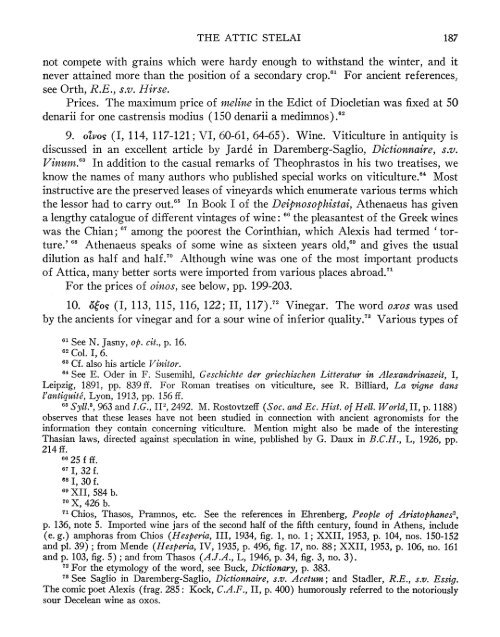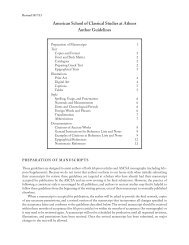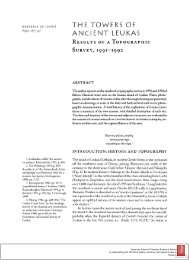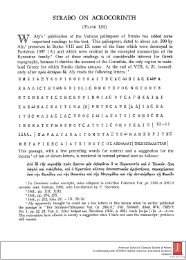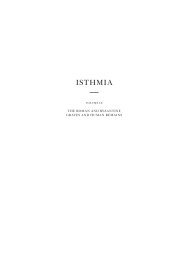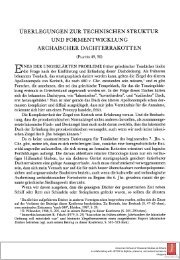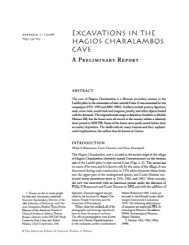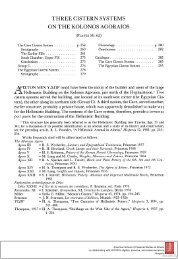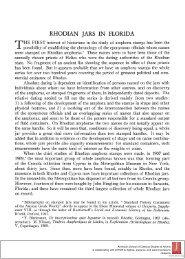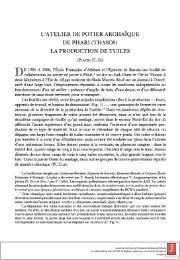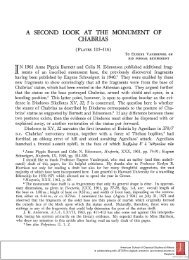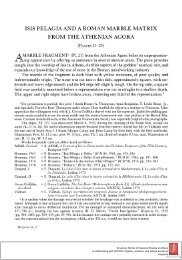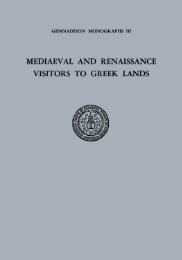the attic stelai - The American School of Classical Studies at Athens
the attic stelai - The American School of Classical Studies at Athens
the attic stelai - The American School of Classical Studies at Athens
Create successful ePaper yourself
Turn your PDF publications into a flip-book with our unique Google optimized e-Paper software.
THE ATTIC STELAI 187<br />
not compete with grains which were hardy enough to withstand <strong>the</strong> winter, and it<br />
never <strong>at</strong>tained more than <strong>the</strong> position <strong>of</strong> a secondary crop.6' For ancient references,<br />
see Orth, R.E., s.v. Hirse.<br />
Prices. <strong>The</strong> maximum price <strong>of</strong> ieline in <strong>the</strong> Edict <strong>of</strong> Diocletian was fixed <strong>at</strong> 50<br />
denarii for one castrensis modius (150 denarii a medimnos).62<br />
9. ohvog (I, 114, 117-121; VI, 60-61, 64-65). Wine. Viticulture in antiquity is<br />
discussed in an excellent article by Jarde in Daremberg-Saglio, Dictionnaire, s.v.<br />
Vinun.63 In addition to <strong>the</strong> casual remarks <strong>of</strong> <strong>The</strong>ophrastos in his two tre<strong>at</strong>ises, we<br />
know <strong>the</strong> names <strong>of</strong> many authors who published special works on viticulture.64 Most<br />
instructive are <strong>the</strong> preserved leases <strong>of</strong> vineyards which enumer<strong>at</strong>e various terms which<br />
<strong>the</strong> lessor had to carry out.65 In Book I <strong>of</strong> <strong>the</strong> Deipnosophistcai, A<strong>the</strong>naeus has given<br />
a lengthy c<strong>at</strong>alogue <strong>of</strong> different vintages <strong>of</strong> wine: 66 <strong>the</strong> pleasantest <strong>of</strong> <strong>the</strong> Greek wines<br />
was <strong>the</strong> Chian; " among <strong>the</strong> poorest <strong>the</strong> Corinthian, which Alexis had termed 'torture.'<br />
68 A<strong>the</strong>naeus speaks <strong>of</strong> some wine as sixteen years old,69 and gives <strong>the</strong> usual<br />
dilution as half and half.70 Although wine was one <strong>of</strong> <strong>the</strong> most important products<br />
<strong>of</strong> Attica, many better sorts were imported from various places abroad.7<br />
For <strong>the</strong> prices <strong>of</strong> oinos, see below, pp. 199-203.<br />
10. 6'eoa (I, 113, 115, 116, 122; II, 117).72 Vinegar. <strong>The</strong> word oros was used<br />
by <strong>the</strong> ancients for vinegar and for a sour wine <strong>of</strong> inferior quality.73 Various types <strong>of</strong><br />
61 See N. Jasny, op. cit., p. 16.<br />
62 Col. I, 6.<br />
63<br />
Cf. also his article Vinitor.<br />
64<br />
See E. Oder in F. Susemihl, Geschichte der griechischen Litter<strong>at</strong>utr in Alexandrinazeit, I,<br />
Leipzig, 1891, pp. 839 if. For Roman tre<strong>at</strong>ises on viticulture, see R. Billiard, La vigne dans<br />
l'antiquite, Lyon, 1913, pp. 156 ff.<br />
65 Syll.3, 963 and I.G., I12, 2492. M. Rostovtzeff (Soc. and Ec. Hist. <strong>of</strong> Hell. World, II, p. 1188)<br />
observes th<strong>at</strong> <strong>the</strong>se leases have not been studied in connection with ancient agronomists for <strong>the</strong><br />
inform<strong>at</strong>ion <strong>the</strong>y contain concerning viticulture. Mention might also be made <strong>of</strong> <strong>the</strong> interesting<br />
Thasian laws, directed against specul<strong>at</strong>ion in wine, published by G. Daux in B.C.H., L, 1926, pp.<br />
214 ff.<br />
66 25 f fif.<br />
67 I, 32 f.<br />
88 I, 30 f.<br />
69<br />
XII, 584 b.<br />
70 X, 426 b.<br />
71 Chios, Thasos, Pramnos, etc. See <strong>the</strong> references in Ehrenberg, People <strong>of</strong> Aristophanes2,<br />
p. 136, note 5. Imported wine jars <strong>of</strong> <strong>the</strong> second half <strong>of</strong> <strong>the</strong> fifth century, found in A<strong>the</strong>ns, include<br />
(e. g.) amphoras from Chios (Hesperia, III, 1934, fig. 1, no. 1; XXII, 1953, p. 104, nos. 150-152<br />
and pl. 39); from Mende (Hesperia, IV, 1935, p. 496, fig. 17, no. 88; XXII, 1953, p. 106, no. 161<br />
and p. 103, fig. 5); and from Thasos (A.J.A., L, 1946, p. 34, fig. 3, no. 3).<br />
72 For <strong>the</strong> etymology <strong>of</strong> <strong>the</strong> word, see Buck, Dictionary, p. 383.<br />
73 See Saglio in Daremberg-Saglio, Dictionnaire, s.v. Acetumt; and Stadler, R.E., s.v. Essig.<br />
<strong>The</strong> comic poet Alexis (frag. 285: Kock, C.A.F., II, p. 400) humorously referred to <strong>the</strong> notoriously<br />
sour Decelean wine as oxos.


